高级英语第一册第七课lesson7 expressions资料
高一英语:第一册新教材unit 7(参考文本)

( 英语教案 )学校:_________________________年级:_________________________教师:_________________________教案设计 / 精品文档 / 文字可改高一英语:第一册新教材unit7(参考文本)Learning English is conducive to making friends, chatting or working together with foreigners, and learning English is very useful for traveling abroad.高一英语:第一册新教材unit 7(参考文本)Unit 7 Cultural relicsI. Teaching Goals:A. Language study:1.Words & expressions: bring…back to life, give in (to sb.), in ruins, in pieces2. Word formation: prefix re + verb.3. Sentence patter: Where there is a river, there is a city.B. Speaking:1. Talk about cultural relics.2. Talk about ways to protect cultural relics.3. Give advice and make suggestions.C. Grammar:1. Use the Present Perfect Passive Voice.D. Writing:1. Write a letter to the editors.E. Emotion task:1. Cultivate the students’ love for cultural relics.II. Teaching time: four periodsPeriod 1: 1) Talk about cultural relics and the ways to protect cultural relics2) Give advice and make suggestions.Period 2: 1) Read the passage “ A City of Heroes”.2) Learn how to give a proper title for a passage.Period 3: Enable the students to use the Present Perfect Passive VoicePeriod 4: Learn how write a letter.Period 5: Learn the important language points in this unitIII. Teaching Aids:1. a tape recorder2. a projectorThe Second PeriodI. Teaching Aims:1. Understand the main meaning of the passage.2. Learn how to find the topic sentence of each paragraph.3. Learn how to give a proper title for a passage.II. Teaching Important Points:1. How to give a proper title for a passage.III. Teaching Difficult Points:1. How to grasp the main idea of a passage2. How to find the topic sentence.IV. Teaching Methods:1. Use the Discussion method to make the students understand what they have learnt in class.2. Use pair work and group work to get every student totake part in the class activities.V. Teaching Aids:1. a projectorVI. Teaching Procedures:Step 1 Greetings and RevisionGreet the whole class as usual.T: In the last period, we learned about some cultural relics in the world. Perhaps we all know that many cities have their own cultural relics. Some cultural relics have become the symbols(象征) of the cities. Now I’ll show you some pictures. Please look at them and try to give the names of the cities.(Show the following slides and ask the students to give the names of the cities.)1. Eifel Tower — Paris2. The Temple of Heaven— BeijingHuai’an(Huaiyin)Paris3. Zhou Enlai Memorial — Huai’anBeijing(1) (2) (3)Step 2 Pre-readingT: Several years ago, we changed the name of our city from Huaiyin to Huai’an. Could you tell me why we did so? Yes, because Huai’an is Zhou Enlai’s hometown and Zhou Enlai is a world famous great man. Huai’an can become more famous for this great man.Of course, in the world there are many other cities that are famous for some great men or heroes.Today we are going to learn a passage about “ A City of Heroes”. Now, Who can tell me the name of the city? ( StPetersburg) (Show the following slide)A City of Heroes— St PetersburgStep 3. Showing the AimsT: In this passage we should … ( Show the following slide) Step 4 Brief introductionT: Now I’d like to talk about the passage briefly. ( Show the following slide)Brief Introduction1703St Petersburg1914Petrograd1924Leningrad1991St Petersburgthe second largest city in Russiathe largest port in Russia“the Northern Venice”Step 5. Fast Reading (Discussing)T: Now, please read the passage quickly and then try to discuss the question on the screen (Show the following slide) Fast ReadingQuestion:Who are the heroes of St Petersburg?A. Peter the Great — built the city of St PetersburgB. The people of St Petersburg — fought against the enemy and rebuilt the city of St PetersburgStep 6. Careful ReadingA. Read the passage carefully and choose the best answers: (Show the slide)Careful Reading (1)Choose the best answer:1. What is always true according to the passage?A. Where there is a river, there is a city.B. St Petersburg in Russia is on the Neva River.C. St Petersburg seems to be something out of a fairytale.D. St Petersburg is the capital of Russia.2. When did the city come back to life?A. Three hundred years ago.B. After the Russian Revolution of 1917.C. Nine hundred days after the Germans attack.D. Years after the Germans had gone.( Key: 1. B 2. D )B. Now please read the passage carefully once more and try to tell the following statements true (T) or false (F) (Show the following slide)Careful Reading(2)B. Tell the statements true (T) or false (F)1. The city of St Petersburg was rebuilt by Peter the Great. ( )2. The Germans attacked St Petersburg a hundred years ago. ( )3. A portrait of Peter the Great was destroyed by the Germans. ( )4. It was difficult for people to rebuild the old palaces. ( )5. St Petersburg will never be as beautiful as it was before. ( )( Key: 1.F 2.F 3.T 4.T 5.F )Step 7. Post-readingT: Now let’s discuss the following question in groups of four. (Show the following slide)Post-readingWhat does the passage want to tell us?(Five minutes later the following slide is shown and the students are asked to choose the best answer)Post-readingWhat does the passage want to tell us ?A. How beautiful the city is.B. How great the Russian Czars were.C. How great the people of the city are.D. How old the city is.( Key: C )Step 8. StructureT: Now please read the passage again and try to find the topic sentence of each paragraph (Show thefollowing slide) StructureTry to find the topic sentence of each paragraph:Paragraph 1: The Russian Czar Peter the Great built St Petersburg.Paragraph 2: St Petersburg has been the center of many important events in history.Paragraph 3: The people of St Petersburg rebuilt the city.Paragraph 4: The people of St Petersburg are the modern heroes of Russia.(Three minutes later, check the answers. The answers are shown on the screen above)T: Well, who could tell us where we found the topic sentence?( Paragraph 1—Middle; Paragraph 2 —Beginning; Paragraph 3 — Beginning; Paragraph 4 — End)T: Now tell me which topic sentence do you think is the most important one.( The last one. Because it is related with the title.) Yes, very good. Now let’s have a discussion: (Show the followingslide)Discussion1. What does the title of the passage imply(含义) ?After two minutes, some choices are given on the screen: Discussion1. What does the title of the passage imply(含义) ?A.There are many heroes living in the city.B.The city is very wonderful.C.Many heroes have been building the city.D.The people of the city are brave and great.( Key: D)Discussion1. What does the title of the passage imply(含义) ?A.There are many heroes living in the city.B.The city is very wonderful.C.Many heroes have been building the city.D.The people of the city are brave and great.2. Why doesn't the author use “St Petersburg” as the title of this passage?T: Well, let’s talk about the other question. (Show the slide)(Two minutes later , ask the students to give the answer to the question , like the following)Discussion1. What does the title of the passage imply(含义) ?A.There are many heroes living in the city.B.The city is very wonderful.C.Many heroes have been building the city.D.The people of the city are brave and great.2. Why doesn't the author use “St Petersburg” as the title of this passage?From the title we can know that the author is praising thepeople of the city instead of just introducing the city.Step 9. ConsolidationT: Now let’s go over the passage and then try to fill in the following boxes( show the slide)Three minutes later, check the answers orally, like the following:Step 10. MoralityT: What can we learn from the people of St Petersburg? (Show two mottos on the screen)MoralityWhat can we learn from the people of St Petersburg?★“Difficulty gives in to a strong – willed man”世上无难事,只怕有心人。
《高级英语》第一册课文7-15翻译、词汇_张汉熙
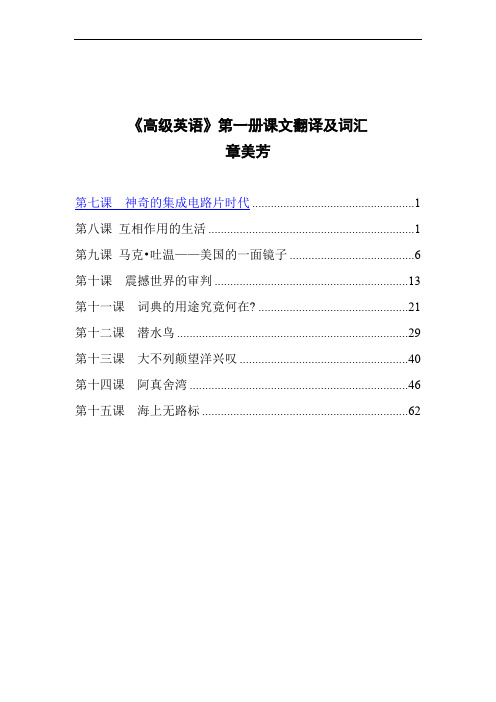
Learn General Secretary on "two to learn a" strengthening "four Consciousnesses" important speech caused a strong reaction in the country. Time, watching "red treasure", the origin of building the party back to power, how to strengthen services for the masses, improve party cohesion, fighting to become the grass-roots party members and masses hot topic. Grass-roots party organizations "two" is to strengthen the service of party members and cadres, the pioneer spirit. Distribution of grass-roots party organizations in all walks of people, clothing, shelter, which belongs to the nerve endings of the party organization and comments reputation has a direct perception of the masses. Strengthen the party ahead of the "pedal" spirit; strengthen the party members and cadres "success does not have to be me" and "the first to bear hardships, the last to" service spirit to set the party's positive image among the people is important. Grass-roots party organizations "two" is to cleanse all people not happy not to see "stereotypes", establish the honest faithful, diligent faith for the people. No need to avoid mentioning that, some members of our party can not stand the "money," corrosion of temptation, thin, Xu Zhou, such abuse and corrupt bribery, malfeasance borers, and rats. Two, is to clean up, thin, Xu, Zhou's solution to restore the party's fresh and natural, solid and honest work style. Cleansing "take, eat, card," undesirable and behaviour, "cross, hard and cold, push" attitude. Grass-roots party organizations "two" is to strengthen the sense of ordinary party members, participating in consciousness, unity consciousness. For reasons known, members of grass-roots party branches less mobile, less resources, and the construction of party organizations have some lag. Two studies, is to focus on the grass-roots party branches "loose, soft, loose" problem, advance the party members and cadres, "a gang working", "Hong Kong report." Strong cleanup actions, style and rambling, presumptuous "unqualified" party members, pays special attention to party members and cadres "joining party of thought" problem. "Party building" is obtained in the long-term development of our party's historical experience accumulated. Two is our party under the new historical conditions, strengthen the party's construction of a new "rectification movement." Grass-roots party organizations should always catch the hard work, results-oriented. Two educational outcomes are long-term oriented and become an important impetus for the work. "Two" should have three kinds of consciousness "two" study and education, basic learning lies in the doing. Only the Constitution address the series of party rules, and do solid work, be qualified party members had a solid ideological basis. Only the "learning" and "do" real unity, to form a "learn-learn-do-do" the virtuous cycle, and ultimately achieve the fundamental objective of education. This requires that the Organization《高级英语》第一册课文翻译及词汇章美芳第七课神奇的集成电路片时代 (1)第八课互相作用的生活 (1)第九课马克•吐温——美国的一面镜子 (6)第十课震撼世界的审判 (13)第十一课词典的用途究竟何在? (21)第十二课潜水鸟 (29)第十三课大不列颠望洋兴叹 (40)第十四课阿真舍湾 (46)第十五课海上无路标 (62)learning education, need three kinds of consciousness: one is to establish an integrated awareness. "Learning" and "do" what car isTwo-wheel, bird wings, need to go hand in hand, one end can be neglected. Communist theoretician and man. Only by closely combining theory and practice together in order to truly realize their value. "Learning" is the Foundation, the Foundation is not strong, shaking; " "Is the key to net to net thousands of accounts. "Two" education, "" lay the basis, going to "do" the key grip, so that the "learning" and "doing" back to standard, so that the majority of party members "learn" learning theory of nutrients, in the "doing" practice party's purposes. Second, to establish a sense of depth. "Learning" and "do" not Chu drawn, entirely different, but the organic unity of the whole. "Two" learning education, we need to explore integrating "learning" in "do", exhibit "do" in "Science". To avoid the "learning" into simple room instruction, "do" into a monotone for doing. Should exploration "learn" in the has "do", "do" in the has "learn" of education and practice of carrier, makes general grass-roots members can in "learn" in the has "do" of achievements sense, in "do" in the has "learn" of get sense, real makes party of theory brain into heart, put for people service concept outside of Yu shaped. Third, to adhere to long-term the awareness. Style construction on the road forever, "two" had to catch the long-term. "Two" study and education, by no means, assault-style wind-sport, but the recurrent education within the party. In recent years, the party's mass line education practice and "three-three" special education in grass-roots borne rich fruits, vast numbers of party members and cadres withstood the baptism of the spirit. "Two" greater need to focus on longer hold long-term, to establish and perfect the effective mechanism of the education, focusing on the creation of long-term education, strive to make the vast number of party members to maintain their vanguard Color, maintain the party's advanced nature and purity. Awareness-raising, antennas and atmosphere – a discussion on how leading cadres of party members "two" current, "two" activity is in full swing up and down the country, party cadres as a "key minority" is both a barometer and impetus. The "two" meaning enough deep, is to determine the party cadres can resolve to study hard first. In the "two" in the process, some cadres of himself, standing long, high awareness, that Constitution Party rules is simple, its not worth bothering some party cadres think speak series has nothing to do with the grass-roots work, water business learning series of speeches seen as window dressing. These "lazy, casual, and decadent" ideas learning lacks motivation, a serious impediment to "two" effect. John Stuart Mill once said, only a basic element of human thought patterns change dramatically, human destiny can make great improvement. The same, only party members and第七课神奇的集成电路片时代(节选)新生的微型技术将使社会发生巨变1这是一个极小的薄片,只有大约四分之一英寸见方。
(完整版)新概念英语第一册第七课

she's he's it's
You/we/they+are you're we're they're
I am a new student. My name's Robert.
Nice to meet you. My name's Sophie.
I am的一般疑 问句为Are you…?
What nationality are you?
I'm Italian.
常用来询问对方国籍。还 可以说成: ➢ What is your nationality? ➢ Where are you from? ➢ Where do you come from?
Are you a teacher?
英语中,表示国籍的名词前通常没有冠词。 He/She is +国籍 He is German. 他是德国人。 She is Japanese. 她是日本人。
Translations (请翻译)
1. 你是中国人吗? 1. Are you Chinese?
2. 她是意大利人吗? 2. Is she Italian?
England
What nationality is he/she? He/She is ……
What nationality is he/she? He/She is …
What nationality is he/she? He/She is ……
I am a computer operator 1
name
名字
job
国籍
nationality
what 什么 工作
高级英语上课件Lesson7
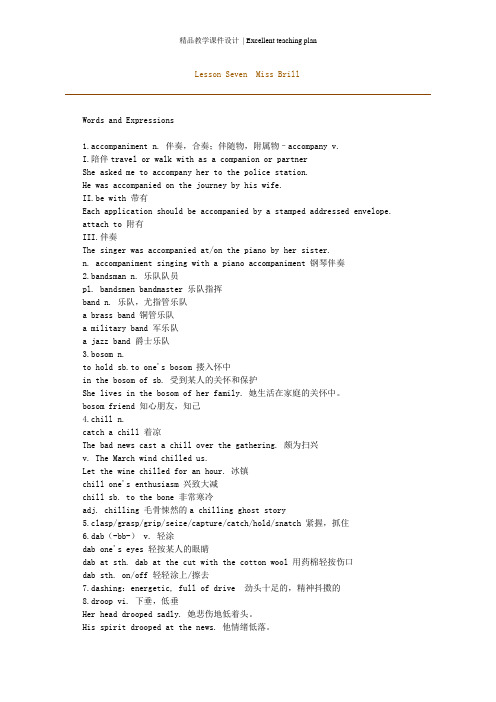
Lesson Seven Miss BrillWords and Expressions1.accompaniment n. 伴奏,合奏;伴随物,附属物–accompany v.I.陪伴travel or walk with as a companion or partnerShe asked me to accompany her to the police station.He was accompanied on the journey by his wife.II.be with 带有Each application should be accompanied by a stamped addressed envelope. attach to 附有III.伴奏The singer was accompanied at/on the piano by her sister.n. accompaniment singing with a piano accompaniment 钢琴伴奏2.bandsman n. 乐队队员pl. bandsmen bandmaster 乐队指挥band n. 乐队,尤指管乐队a brass band 铜管乐队a military band 军乐队a jazz band 爵士乐队3.bosom n.to hold sb.to one's bosom 搂入怀中in the bosom of sb. 受到某人的关怀和保护She lives in the bosom of her family. 她生活在家庭的关怀中。
bosom friend 知心朋友,知己4.chill n.catch a chill 着凉The bad news cast a chill over the gathering. 颇为扫兴v. The March wind chilled us.Let the wine chilled for an hour. 冰镇chill one's enthusiasm 兴致大减chill sb. to the bone 非常寒冷adj. chilling 毛骨悚然的a chilling ghost story5.clasp/grasp/grip/seize/capture/catch/hold/snatch 紧握,抓住6.dab(-bb-) v. 轻涂dab one's eyes 轻按某人的眼睛dab at sth. dab at the cut with the cotton wool 用药棉轻按伤口dab sth. on/off 轻轻涂上/擦去7.dashing:energetic, full of drive 劲头十足的,精神抖擞的8.droop vi. 下垂,低垂Her head drooped sadly. 她悲伤地低着头。
高英1第三版第七课中英文对照

高英1第三版-第七课中英文对照I will wait for her in the yard that Maggie and I made so clean and wavy yesterday afternoon. A yard like this is more comfortable than most people know. It is not just a yard. It is like an extended living room. When the hard clay is swept clean as a floor and the fine sand around the edges lined with tiny, irregular grooves, anyone can come and sit and look up into the elm tree and wait for the breezes that never come inside the house.我就在这院子里等着她,昨天下午我和玛吉把院子收拾得干干净净,地面还有清扫留下的波纹。
大多数人都不明白,这样的院子比他们想的要舒适。
它不只是个院子,而像是扩大的客厅。
当院子里的硬泥地给打扫得像屋内地板一样干净,周边的细沙上布满细小不匀的沟纹时,谁都可以进来坐坐,抬头观赏榆树,等待永远也吹不进屋的阵阵微风。
[2] Maggie will be nervous until after her sister goes: she will stand hopelessly in corners, homely and ashamed of the burn scars down her arms and legs, eying her sister with a mixture of envy and awe. She thinks her sister has held life always in the palm of one hand, that "no" is a word the world never learned to say to her.[2] 在她姐姐离开之前,玛吉会一直紧张不安:相貌平平的她会迷惘地站在角落里,羡慕而敬畏地看着姐姐,为手臂和腿上烧伤留下的疤痕自惭形秽。
新概念英语第一册第7课

Character relationships
Characters: The story features a diverse cast of characters with different backgrounds and experiences.
Summary: The characters' relationships and interactions contribute to the overall narrative and provide insights into the theme.
Details: The characters support and encourage each other in their language learning journey, demonstrating the power of community and collaboration in learning. Their individual experiences and perspectives add depth to the theme, making it more relatable and meaningful to learners.
Determining tense and voice
Tense indicates when the action took place (past, present or future), and voice indicates whether the subject is performing the action (active voice) or receiving it (passive voice).
Understanding sentence complexity
lesson-7-高英教学内容

l e s s o n-7-高英Comments on The Ones Who Walk Away from OmelasThis piece of writing, which was written by Ursula Le Guin, really provoked my deep feeling about the city Omelas, the people there, the little kid who was suffering in lieu of all the other citizens in the city. Further, I think about the real situation of our society. By comparing and contrasting, there are similarities and differences among the real world and the city imagined by the writer of the story. A couple of questions are still lingering on my mind: who and why choose the little kid to be the one suffering? How can all the citizens of Omelas in the story enjoy their life by ways of celebrating the Festival of Summer, forgetting and avoiding all the pains and sufferings? Why is there nobody to stand up and to guard against all the others to escape the little kid from those extreme pains? And why do people there choose to walk away from that city instead of doing something to solve the difficult problem? It is such kind of questions that help me think more and change myself in a way.First of all, who is the right person to make the decision on choosing the little kid to be the one suffering, and why this must be so in such a city? On one hand, we can not read from or even beyond the lines to know that there is such a person. Instead, we know from the description of the writer that there is no king in the city at all. Common sense informs me that it is always the king, or saying the monarch, to decide who is going to be punished, praised or awarded. But since there is no king in the city, the citizens themselves are the decision-makers. It is possible that when such a little kid was born, he had already been chosen to be the most unlucky baby. Based on their belief, religion, or tradition, when a baby was born in a special place at a special time, or if there is any sign of bad luck marked on its body, it must be put in that dirty dark room thereafter for no other reasons. On the other hand, I was wondering why such a terrible case must exist in the city of Omelas after I have read this story for the first time. The citizens, who are happy and naive and pure, tend to ignore the existence of the little kid though some of them have already known that. They are naive enough to think that if they ignore the existence of the little kid staying in the dark room suffering, they will definitely have a harmonious and happy life with no problems any longer, but this is absolutely wrong.Similarly, how can the citizens of the city celebrate happily their summer festival, forgetting the pains behind the happiness? What they are doing is going against their conscience in the sense that no one can grasp or enjoy his/her happiness based on thesufferings and pains of the other people. Strictly speaking, no one in the whole world can enjoy happiness all the time, leaving no placeor having no chance of being sad. Life is always going up and down over time. In other words, once we were happy about a certaineven happening around or to us, there must be other time for us to live under strong stress, sadness and even anguish. Imagine a person, who is always presenting his/her happiness to the people around, to be one of my acquaintance. Will I believe in his/her everlasting happiness? Of course not. For a time or so, such a person will not talk about his pains and sorrows if he/she does not really want to share with someone who is not his/her best friend.But as I have observed in life, such a kind of person is everywhere, sometimes including me.In addition, why is there nobody who can stand up and guard against the others to escape the little kid from suffering futher pains? Such a case can be explained partly by our human nature. By nature, people are shy, and nobody really want to be a marverick. We are moderate, and we like to be the same with the people around. To say something against the public or catholic view is nota wise choice for anyone. This is the same with the people in Omelas. Since there is not a single person who can initiate the protest against locking the little kid, no one else can stand up and complain about the bad situation. If someone can really stand up and say something to such an issue, the problem with the little kid can be solved for a long time. What’s more, the characteristic to be shy in the public can be well interpreted in schools or universities. When a teacher or a professor is asking a question to all the students in the classroom, it is rare for anyone to answer it though the answer to the question is always quite easy and obvious. By constrast, if there is someone in the class who can answer the questions of the teacher or the professor, others will be brave enough then to respond to the following questions. It can also be explained by our human nature—shy and moderate.Finally, why there are people who choose not to solve the problem by saving the little kid, but to walk away from there. It is better for them to be together and solve the problem of the city.But they simply choose to walk away, avoiding futher contact with the bad situation. In no sense is such a way sensible and correct based on morals or conscience. In real life, when we are facing some difficulties or problems, the worst way of all is to avoid the difficulties or problems. We can try to find solutions by asking our parents who have more experiences of life than us; we can also talk to our friend and discuss the solutions to the prolems together. It iswiser of the people of Omelas to calm down first, to think more about the current situation, and to find solutions by discussing or cooperating. But they just walk away, without responsibility, without any care for the little kid.To sum up, this story is really thought-provoking. By thinking more about what is going on in the city of Omelas and by comparing and constrasting the situation there and here in our real world, we can learn more than what we have read or heard about before.。
高级英语第7课课件

Paragraph 1
2. The “I” here is the narrator, not the author, and the author is using the firstperson narration in telling the story. As we read on, we will find this narrator is also the main character, the protagonist, of the story.
Paragraph 1
• 3. Words like “I was looking for myself” and “I am nobody but myself” point out the central theme of the novel— searching for self-identity. The narrator was probably asking himself questions like “Who am I?” “What do I want?” “Where did I come from and where am I going?” in order to find his own identity as an individual. • The theme of a story is the central and dominating idea, the general meaning of a story, or the insight the entire story reveals.
Lesson 7 Invisible Man
Ralph Ellison
About the Author
新概念英语第一册第七课

To be able to understand and engage in simple shopping conversations, and to express shopping needs and intentions in English.
Emotional goal
What is she doing? (What is she doing?)
Analysis
This sentence is a declarative sentence in the simple present tense, indicating a frequent behavior.
Imitation
Associative memory method
associating new words with known things or images to form interesting associations for memory. For example, when memorizing an elephant, one can imagine an elephant with a long water pipe coiled around its trunk.
01
02
03
04
Vocabulary 2: Important
Part of speech: adjective
Meaning: Important
Example sentence: It's important to drive on time (It is important to arrive on
Vocabulary Expansion and Memory Skills
自考高级英语上册Lesson_7课件

Katherine Mansfield (Oct. 14, 1888--d. Jan. 9, 1923 ).
Other
works are: The Aloe, Prelude, Bliss and other stories, The Daughters of the Late Colonel, The Garden- Party, Dove' s Nest, Something Childish. Mansfield learned that plot is not as important as atmosphere. Description, dialogue and above all, imagery develop her themes. With James Toyce she was one of the founders of the modem English short story.
16.
rescue
(1) v.~ sb/sth from sth/sb: save or bring away sb from danger 搭救,救出 E.g. You rescued me from an embarrassing situation. 你给我解了围。
(2) n. rescuing or being rescued 救援 E.g. Our car couldn’t start, but a friend came to the rescue and drove us home. 我们的车开不动了,一位朋友赶来帮助,开车送我 们回家。 17. scold v. ~ sb for sth/for doing sth (= tell off) 训斥,责骂 E.g. The teacher ~ed them for arriving late. n. scolding E.g. I got a ~ from my tutor. 18. swoop v. (1) come down suddenly with a rushing movement; seize the whole of sth in one movement 向下猛冲;一下子抢走
高级英语第7课 The Libido for the Ugly[精]
![高级英语第7课 The Libido for the Ugly[精]](https://img.taocdn.com/s3/m/b25dfb27e518964bce847c2f.png)
His Style
He employed a huge vocabulary and liked to insert unusual or unexpected words, for surprise or comic effect, into otherwise normal sentences. Although his style is occasionally difficult to read, Mencken is still considered one of the best and liveliest essayists of this century.
"The American Language"
a) It examined the development of the English language in America,
b) It contrasted English and American expressions and usage.
*/gibbonsb/mencken/*
Description
Description is painting a picture in words of a person, place, object and scene.
Description
It conveys the sensations, emotions and impressions that affect a writer experiencing a person, place, object or idea. The writer describes what he sees, hears, smells, feels or tastes, and it often includes his emotional reactions to the physical sensation of the experience.
高级英语第一册第七课lesson7 expressions资料

Don’t shuffle, give us a clear answer.
别躲躲闪闪的,给我们一个明确的答复。
He tries to shuffle his work off onto others.
She shuffled out of the chores by saying she felt ill.
他个子太高,所以时常弓着背。
(idm) stoop so low (as to do sth): (fml) drop your moral standards far enough to do sth bad or unpleasant.
She was unwilling to believe anyone would stoop so low as to steal a ring from a dead woman’s finger.
Walk properly, don’t shuffle.
好好走, 脚别蹭地。
人群缓慢地移动,走出剧院
The crowd shuffled out of the theatre .
He shuffled the papers (around) on the desk, pretending to be busy.
abruptly. crop of sth: group of people or quantity of things appearing or
produced at the same time The program brought quite a crop of complaints from viewers. 该节目招致观众诸多不满。 crop n. 平头 v 剪短,啃吃; 收获 Sheep had cropped the grass short. The beans cropped well this year. (idm) neck and crop: completely His shot beat the goalkeeper neck and crop. 他射门,守门员根本挡不住。
高级英语第一册第7课课件

Gቤተ መጻሕፍቲ ባይዱoup Discussion: 1 What a special thing should we owe our modern life to ? 2 Can we enjoy our convenient modern life without chips? 3 How has the technology of chips been utilized in college students’ life? (In what ways have college students live and study cozily with the help of chips?) Please say sth. about digital campus. 4. In what other fields have chips been employed in people’s life? 5. Can you list some goods which contain chips?
cf. macro- big, large macrocosm 宏观世界 macroeconomics 宏观经济学 macro-chemistry 常量化学 macroclimate 大气候 macrostructure 大型结构 macro-scale 大规模
Stylize: vt. Having the style/pattern of sth.具有某 具有某 种风格 4. aerial:a. existing in the air : Eg. Aerial photography 空中摄影 aerial current 气流 Aerial attack 空袭 aerial view: a view from the air, from the sky or an antenna 鸟瞰图 Switching yard: an area where railroad trains are made up and cars are switched, stored or served. Grain: n. a relatively small particle Eg. 一粒沙子- 一粒沙子- A grain of sand/ salt
高级英语第一册lesson7

Mass production of the miracle chip has already made possible home computer systems that sell for less than $800 – and prices will continue to fall. Many domestic de-vices that use electric power will be computerized. Eventually, the household computer will be as much a part of the home as the kitchen sink; it will program washing machines, burglar and fire alarms, sewing machines, a robot vacuum cleaner and a machine that will rinseand stack dirty dishes. When something goes wrong with an appliance a question to the computer will elicit repair instructions – in future generations, repairs will be made automatically. Energy costs will be cut by a computerized device that will direct heat to living areas where it is needed, and turn it down where it is not; the device's ubiquitous eye, sensing where people are at all times, will similarly turn the lights on and off ushbutton Power
《高级英语1》Lesson-7-马克吐温
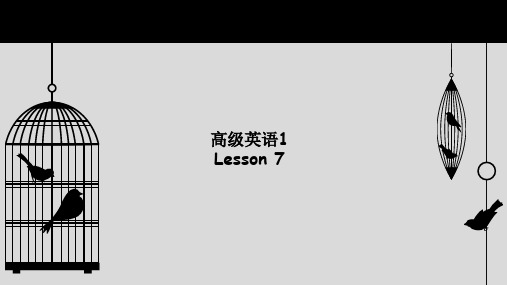
Famous words
Don’t go around saying the world owes you a living. The world owes you nothing. It was here first.别到处说世界亏欠了你。世界什么都不欠 你的,你还没出生它就在这儿了。
Kindness is the language which the deaf can hear and the blind can see.善良是一种聋子能听见、 盲人能看见的语言。
自传》
Stories:
• 1867 The Celebrated Jumping Frog of Calaveras County 《卡县名蛙》
• 1870 Running for Governor 《竞选州长》 • 1893 The L1,000,000 Bank Note 《百万英镑》 • 1899 The Man That Corrupted Hadleyburg
《败坏了哈德莱堡的人》
Section D: Assessments of Mark Twain
Helen Keller : I have been in Eden three days and I king when I touched him though I had never touched a king before.
1. Mirror--- a piece of glass or other shinny/polished surface that reflects images.
2. Mirror---Metaphor(隐喻,暗喻) ① "Mirror" here means a person who gives a true representation or description of the country. ② Generally speaking, all literary giants in human history are also great historians, thinkers and philosophers. Their works often reveal more truth than many political essays. ③ Mark Twain was one of these giants, and his life and works are a mirror of America of his time.
新概念英语第一册第7课课件
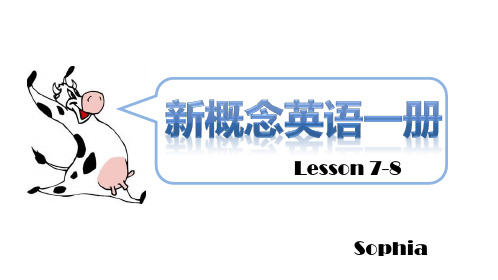
Sophia
Words and expressions
keyboard
engineer
policeman[pə'li:smən]
policemen
policewoman[pə'li:s,wumən]
policewomen
taxi driver
air hostess
Report: My friend…’s father/mother is a/an…He/She works in a…He /She
B: He/She wants to be a/an…
What nationality is he?
Comprehension
1 T: Is Robert a new student? S:Yes,he is. T: What nationality is Robert? S: He is Italian
2 T: What nationality is Sophie? S: She is French. T: What's Sophie's job? S: She is a keyboard.
3 T: What's Robert's job? S: He's an engineer. T:Is Sophie a teacher? S:No. she isn't. 4.What's your job? I'm a student.
a policeman
What does he / she do? What’s his / her job?
interesting
a student
What does he / she do? What’s his / her job?
高级英语上讲义Lesson7

Lesson Seven Miss BrillWords and Expressions1.accompaniment n. 伴奏,合奏;伴随物,附属物–accompany v.I.陪伴travel or walk with as a companion or partnerShe asked me to accompany her to the police station.He was accompanied on the journey by his wife.II.be with 带有Each application should be accompanied by a stamped addressed envelope. attach to 附有III.伴奏The singer was accompanied at/on the piano by her sister.n. accompaniment singing with a piano accompaniment 钢琴伴奏2.bandsman n. 乐队队员pl. bandsmen bandmaster 乐队指挥band n. 乐队,尤指管乐队a brass band 铜管乐队a military band 军乐队a jazz band 爵士乐队3.bosom n.to hold sb.to one's bosom 搂入怀中in the bosom of sb. 受到某人的关怀和保护She lives in the bosom of her family. 她生活在家庭的关怀中。
bosom friend 知心朋友,知己4.chill n.catch a chill 着凉The bad news cast a chill over the gathering. 颇为扫兴v. The March wind chilled us.Let the wine chilled for an hour. 冰镇chill one's enthusiasm 兴致大减chill sb. to the bone 非常寒冷adj. chilling 毛骨悚然的a chilling ghost story5.clasp/grasp/grip/seize/capture/catch/hold/snatch 紧握,抓住6.dab(-bb-) v. 轻涂dab one's eyes 轻按某人的眼睛dab at sth. dab at the cut with the cotton wool 用药棉轻按伤口dab sth. on/off 轻轻涂上/擦去7.dashing:energetic, full of drive 劲头十足的,精神抖擞的8.droop vi. 下垂,低垂Her head drooped sadly. 她悲伤地低着头。
新概念英语第一册第7课
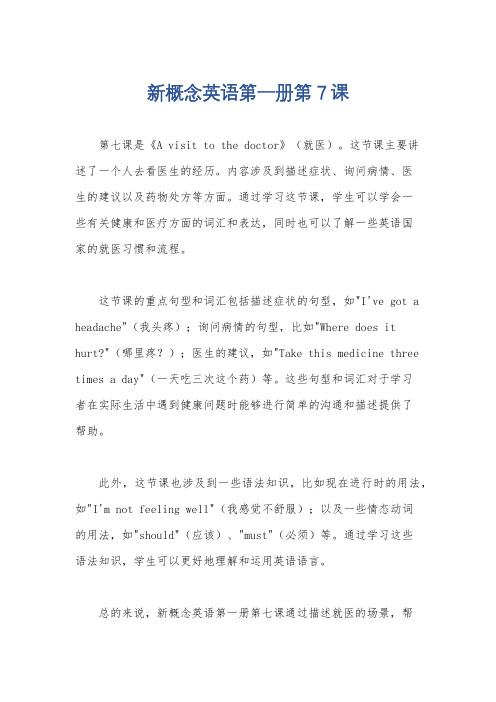
新概念英语第一册第7课
第七课是《A visit to the doctor》(就医)。
这节课主要讲述了一个人去看医生的经历。
内容涉及到描述症状、询问病情、医
生的建议以及药物处方等方面。
通过学习这节课,学生可以学会一
些有关健康和医疗方面的词汇和表达,同时也可以了解一些英语国
家的就医习惯和流程。
这节课的重点句型和词汇包括描述症状的句型,如"I've got a headache"(我头疼);询问病情的句型,比如"Where does it hurt?"(哪里疼?);医生的建议,如"Take this medicine three times a day"(一天吃三次这个药)等。
这些句型和词汇对于学习
者在实际生活中遇到健康问题时能够进行简单的沟通和描述提供了
帮助。
此外,这节课也涉及到一些语法知识,比如现在进行时的用法,如"I'm not feeling well"(我感觉不舒服);以及一些情态动词
的用法,如"should"(应该)、"must"(必须)等。
通过学习这些
语法知识,学生可以更好地理解和运用英语语言。
总的来说,新概念英语第一册第七课通过描述就医的场景,帮
助学生学习相关的词汇、句型和语法知识,为他们提供了在实际生活中进行简单健康对话和沟通的能力。
同时,也让学生了解了英语国家的医疗习惯和文化,为他们的跨文化交流打下了基础。
(完整版)高级英语第七课课件第三版EverydayUseforYourGrandmama

(完整版)高级英语第七课课件第三版EverydayUseforYourGrandmamaEveryday Use for Your GrandmamaIn order to understand this passage better, we can watch a movie---”The Color of Purple”故事发生于1909年美国南部。
未受过教育的黑人女孩西莉被继父强奸后,又被迫嫁给了粗鲁,凶狠的黑人男子,西莉称其为“先生”。
在惊恐和胆怯中她开始了奴仆一般的痛苦生活。
幸而有亲姐妹南蒂与之相伴,泪水中才多了一些欢乐。
不久,这短暂的幸福也从西莉身边消失了。
因为“先生”强奸南蒂不成,恼羞成怒地将南蒂赶了出去,姐妹二人被残酷的分开。
年复一年,西莉在门口的邮筒中找寻南蒂的音讯,她始终期盼有一天能与南蒂再次重逢……(从中大家可以看到当时的整个社会的缩影,以及黑人生活的社会环境和社会地位,黑人女性的崛起和黑人女性的反抗精神也从有深刻得展现)Everyday Use for Your GrandmamaCharacters:Maggie: a shy,young woman made even more self-concious by scars she got in a house fire years ago. She hasn` t has much formal education but has learned traditional skills, such as quilting, from her familiy.Mama(Mrs johnson):the narrator of the story. She is a middle-aged or even older African American woman living with her younger daugter, Maggie. Athough poor, she is strong and independent, and takes great pride in her way of life.Dee(Wangero):Dee is Mama` s older daugher. She is attractive, well-educated and sophisticated. Moreover, she is selfish and she may even has caused the fire that disfigured (损毁···的外貌)her sister. Mama(Mrs johnson) called her Dee or Wangero.Asalamalakim: a young muslim man who accompanies Dee on her visit. Mama, unable to pronounce his name , called him “Hakim-a- Baber”. The muslim greeting he gives to her means “peace and happiness to you. ” This maybe ironic because their visit disturbs the peaceful lives of Maggie and Mama. The relationship between him and Dee is unknown. He may be a friend, a boyfriend, husband or spiritual adviser.Main content:The story begins when the mother and Maggie wait for Dee to come back home.Dee goes back home with her lover. She asks for some traditional household appliances, especially two old quilts made by their grandma. The mother refuses. Instead, she sends the two quilts to Maggie. Dee leaves angrily.In her eyes, two old quilts(百纳被) are the cultural heritage of blacks. Maggie inherits the black tradition and she should own them.The text:I. para1-2 The prelude: the three family members.II. Para3-16 The mother’s recollections / flashback:the three persons’relationships——mother; Maggie; DeeIII. Para17- 82 The process of Dee going back home.Detailed study of the text:Paragraph 1---16:Paragraph1:1,...Maggie and I made so clean and wavy...(wavy:波动起伏的。
- 1、下载文档前请自行甄别文档内容的完整性,平台不提供额外的编辑、内容补充、找答案等附加服务。
- 2、"仅部分预览"的文档,不可在线预览部分如存在完整性等问题,可反馈申请退款(可完整预览的文档不适用该条件!)。
- 3、如文档侵犯您的权益,请联系客服反馈,我们会尽快为您处理(人工客服工作时间:9:00-18:30)。
5 make-believe (P11) n 假装,幻想;adj.
Dreamers always indulge themselves in make-believe. 爱做白日梦的人总喜欢沉溺于幻想之中。
was recomposed. 直到警察来了,争吵才被Catherine is self-contemptuous of her stocky legs.
凯瑟琳因为那双又短又粗的腿感到自卑。
a stockily built man
Lesson 7
Book 1
Everyday Use for your grandmama
Alice Walker
Page 1
1 tacky (P4) n. 俗气的, 花哨的,破旧的;(油漆、胶水等)
未干透的 The hunter lived in a tacky old cabin in the woods. 那个猎人住在树林里一间又老又破的小棚屋里。 The paint is still tacky to the touch. She looks tacky in that dress.
她说她不舒服,把杂事都推掉了。
Give the cards a good shuffle.
a shuffle in the Cabinet
内阁改组
Page 3
4 dingy(P10) adj. 肮脏的,邋遢的,无生气的; 昏暗的 He lived in a dingy room in a cheap hotel in order to save
with boiling liquid or steam She scalded her hand with hot fat. 热油烫伤了她的手。
Page 8
10 recompose (P16) v.使恢复镇静,平静下来 It was not until the police arrived that the quarrel
是他所为。
Page 7
9. scalding (P15): 措辞尖锐的,贬低的 Critics made a scalding review of the play. 批评家们对这出戏剧做出了尖刻的评价。 scald v. burn(oneself or part of one’s body)
Walk properly, don’t shuffle.
好好走, 脚别蹭地。
人群缓慢地移动,走出剧院
The crowd shuffled out of the theatre .
He shuffled the papers (around) on the desk, pretending to be busy.
Don’t shuffle, give us a clear answer.
别躲躲闪闪的,给我们一个明确的答复。
He tries to shuffle his work off onto others.
She shuffled out of the chores by saying she felt ill.
Page 6
8 furtive(P15) adj. 偷偷摸摸的,鬼鬼祟祟的 a furtive glance 偷偷的一瞥
furtive movements 诡秘的活动
The man’s furtive manner gave rise to the suspicion of the theft among the policemen. 那个男人鬼鬼祟祟的样子,引起警察怀疑盗窃案
Page 5
7 stumble (P13) v. 绊脚; (说话、演奏)出错;蹒跚;
I stumbled over a tree root. 树根绊了我的脚。 She stumbled over the unfamiliar word but then continued. 她碰到不认识的字愣了一下,接着又往下念。 The child stumbled through a piece by Chopin. 那孩子演奏肖邦的曲子很多流畅。 他太紧张,讲话时结结巴巴的。 He was so nervous that he simply stumbled through the whole speech. Police investigating tax fraud stumbled across a drugs ring. 警方在调查瞒税案件时意外地发现了一个贩毒集团。 He read well, with only several stumblings. 他读得很好,只有几个小错误。 stumbling-block 障碍物;绊脚石
2 sidle (P9) sidle up/over to sb/sth sidle along/past/away She sidled over to me and asked if I recogrized her.
Page 2
3 shuffle (P9) 拖着脚步走;因(紧张、厌烦等)坐着脚乱动或站着走来走去;洗牌; 翻动;推诿
Page 4
6 flicker(P12) (灯光或火焰)闪烁,摇曳; (情感)稍纵即逝
The candle flickered and then went out. 蜡烛忽亮忽暗,接着就全熄了。 A slender hope still flickered within him. 他心中仍闪现出一线希望。 她的脸上闪过一丝微笑。 A faint smile flickered across her face. The leaves flickered gently in the breeze.
